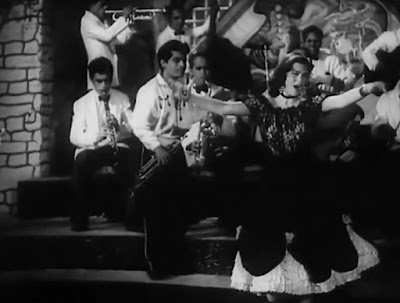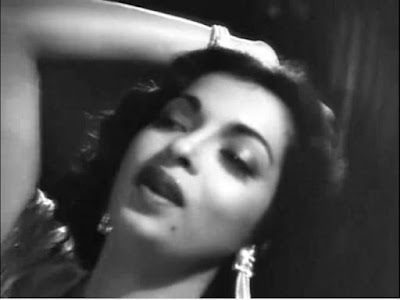Continuing my exploration of Lata Mangeshkar songs under various themes…
In popular perception, ‘nightclub songs’ were sung by Asha Bhosle. Lata was always the voice of the heroine, sweet and virginal. Partly, this perception also arises from the fact that Lata herself refused to sing songs with overtly sexualised lyrics (which is one of the reasons why she had a falling out with Raj Kapoor after Sangam). But, she’s also on record as saying that while her sister, Asha, could have easily sung most of her songs, she couldn’t sing several of Asha’s songs with the same ease. That said, Lata has quite a few ‘nightclub songs’ to her credit. Once again, my thanks to Shalini who inspired me to explore Lata’s foray into ‘forbidden’ territory.
This list, as my previous ones, stand testimony to the sheer variety of genres that this great artiste has sung. [Like Shalini, I’m getting a bit tired of being told “Lata didn’t sing --- (insert genre of your choice)-type songs”!”] She did. Most of them anyway.
While I had initially bought into the myth that Laxmikant-Pyarelal were the ones who gave Lata her first nightclub song (supposedly on Lata’s say-so because she wanted to prove a point to the naysayers who said only Asha could sing them), that is not true at all, given the number of her club songs I discovered from at least a couple of decades earlier. Was Aa jaan-e-jaa.n (Inteqaam)the most cabaret-like number? Perhaps. There is a difference between the average 'club song' and a cabaret. While cabarets originally combined music and dance with political commentary and satire, it soon evolved into primarily music entertainment that was ensemble-based. Eventually, it became cemented in public perception, especially in India, as a dance form where the performers were scantily clad.
The club songs, on the other hand, usually involved a musical performance that incorporated a live band and sometimes, a dance performance in hotels, clubs, villains' dens, etc. The performers may or may not be in western outfits (in fact, Rita Bhaduri in Julie (1975) is demurely clad in a sari).
As always, this is a purely subjective list, so it’s no use asking me why I ‘forgot’ this song. My favourite numbers cluster at the top.
Ae meri zindagi
Taxi
Driver (1954)
Music: SD
Burman
Lyrics: Sahir Ludhianvi
Taxi Driver had three ‘club’ songs by Lata, all picturised on Sheila Ramani. While my initial choice was Dil jale to jale, Ae meri zindagi had the better vibe. (The former is being sung by a comforting Shelia to a forlorn Dev Anand in an empty club.) Ae meri zindagi also had an edge over the peppier Dil se milake dil from the same film – the latter is picturised in what looks like a bar setting rather than a club. In this song, everything comes together – a sultry Sheila dressed to the hilt, a band, the well-dressed diners, an assortment of villains, softly curling cigarette smoke – and a sulky Dev. 'Seize the day' has never sounded more sexy. Lata’s voice, sultry and smoky in the beginning as befits a night club singer, changes as the song proceeds; you can’t miss the anxiety in her voice as the song speeds up.
Awara ae mera dilRaat aur Din (1967)
Music: Shankar-Jaikishan
Lyrics: Shailendra
Another club, another
party, another band and an assorted bunch of youngsters enjoying a party. And
amidst them all, a young woman, singing of a vagabond heart that has no fixed
destination. This is a happy song, and Lata sings it with as much abandon as
Laxmi Chhaya brings to her moves on the dance floor. Listen to it for Lata’s joie de vivre, and watch the song for Laxmi’s expressions and dancing. You will better appreciate the nuances she brings to this song and the difference her singing makes to the mood of the song, when you listen to the 'slow' version (which actually occurs at the beginning of the film) of the same song.
Music: Madanmohan
Lyrics: Rajinder Krishan
Dev Anand seemed to make a habit of going to clubs, especially those belonging to the villains. Here, the sultry singer is Nadira, who beautifully reflects the don’t-care lyrics sung with such verve by Lata – Tu aage aage chal peeche duniya ko aane de /Dekh dekh duniya jo jale jal jaane de /Duniya ki dosti tere kis kaam ki /Dunya ko chhod tujhe duniya se kya. This is another ‘don’t care’ song that is sung with such panache by Lata, who adds just the right zing to her rendition. Pocketmaar also had the sweet Kisi ke thukra kar, which is also sung in the club, but like Dil jale to jale, it is sung in an empty club and cannot really be considered a ‘club song’.
Humne to diya ye dil tumhe piyaBurma Road (1962)
Music: Chitragupt
Lyrics: Majrooh Sultanpuri
Kali Ghata (1951)
Music: Shankar-Jaikishan
Lyrics:
You can’t have a list of club songs and not have Cuckoo. (No matter how weird the film was, and boy, was it wild!) This is not one of her best songs or indeed even best dances, but she is young and happy, and Lata seems to be enjoying herself as well. The song has a nice ‘get up and dance’ vibe to it.
Ye khile khile tare
Qaidi No. 911
Music:
Duttaram Wadkar
Lyrics:
Hasrat Jaipuri
Dattaram Wadkar is probably better known as a musician and arranger and worked extensively with Shankar-Jaikishan. Who can forget the famous ‘Dattaram ka theka’? But he also worked as an independent composer with more than 20 films and over a hundred songs to his credit.
Just when you thing that this is yet another song of yearning, Lata’s voice drops into a husky, teasing, come-hither, Aaja aap bhi jaa… The voice modulation is fabulous. Meenu Mumtaz is the performer, and her expressions alone are worth the price of admission. (There’s also Mehmood in blackface. Don’t say I didn’t warn you.)
Perhaps it is because Dattaram was himself a musician, the interludes feature several individual music pieces. There
is also another lovely, racy (and happy!) nightclub number in this film, also picturised
on Meenu Mumtaz - Tere teer ko humne pyaar se . It was hard to choose between the two, so here it is for your enjoyment. (It is one of those nightclubs that Shalini and I would want to go to.)
Humein to ho gaya hai pyaar
Mere Humdum Mere Dost (1968)
Music: Laxmikant-Pyarelal
Lyrics: Majrooh Sultanpuri
Mere Humdum Mere Dost must rank among the truly stupid films I have watched. No, not even in the so-bad-it’s-good category. It’s filled with brain-dead people making brainless decisions, lying to each other, and not even a gorgeous Dharmendra, a beautiful Sharmila and a vivacious (and the only partly sane person in this movie) Mumtaz can save it from being a train-wreck. It is an unholy mess – except… Laxmikant-Pyarelal’s music. Chhalkaaye jaam, Na jaa kahin ab na jaa (one of my favourites), Hui shaam unka khayaal aa gaya, Allah ye ada … and this one, with a very, very pretty Mumtaz, who is trying her best to warn Dharam away. (Yes, the villain owns a nightclub in this film as well!)
Aur mera naam hai jameelaNight in London (1967)
Music: Laxmikant-Pyarelal
Lyrics: Anand Bakshi
You can’t have a nightclub song, and not include a song by Helen in the list. Like Cuckoo before her, Helen was ubiquitous in the club numbers. While a majority of her song were sung by Asha Bhosle, and by Geeta Dutt and Shamshad Begum before her, Helen did have quite a few songs that were sung by Lata. This song, predating Aa jaan-e-jaa.n by two years is an actual cabaret. Whether India or England, nightclubs must belong to villains – it reflects their image in Hindi films as the dens of vice. I must admit to a fondness for this song, and for Lata’s rendition of it.
Tera jadoo na chalega
Guest
House (1959)
Music:
Chitragupt
Lyrics: Prem
Dhawan
This
is a very unlikely song and dance number for a club number, but is definitely one. Once again, the venue is a
club, and there are the usual roster of villains including Pran and his sidekick,
Tiwari, hanging around, eyeing the heroine, Shakila. As always, the lyrics of the
song seem to hint at something portentous, and Shakila seems to understand its
hidden meaning. Dancing up a storm is Helen and Gopi Krishna as serpent and
snake charmer, respectively.
Allah kare tu bhi aa jaaye
Mr X in Bombay (1964)
Music: Laxmikant-Pyarelal
Lyrics: Anand Bakshi
Kumkum is a graceful dancer, though most of her songs are folk or semi-classical. Here, too, she begins by merely singing; it is Jeevankala who ‘lip-syncs’ to her and dances – in a nightclub. The song, too, barely makes it to a ‘club song’ by virtue of its picturisation, and place in the story. It is always a shame when Kumkum doesn't dance, but thankfully, she does join Jeevankala halfway through the song, with Lata singing for both of them. Or rather, Lata singing for Kumkum, and Jeevankala continuing to ‘lip-sync to ‘Kumkum’s singing.
Smuggler (1966)
Music: Ganesh
Lyrics: Indeevar (?)
Once again, a cabaret that predates even Night in London. (So that answers my question.) This is a lovely ditty by a music composer I have not heard much of; and while I've listed Indeevar as the lyricist, I'm not sure he wrote the lyrics. The film also credits two other lyricists, Asad Bhopali and Zafar Muradabadi. So, if readers can confirm the lyricist, I'll make edits. Set in a nightclub (the front for the villain's den, as usual), you can spot a very young and very handsome Sanjeev Kumar, Mukri, and a very pretty Kumkum. The song is a very peppy dance number, and unlike many of the other songs in this list, does focus on dance during the interludes.
Aa jaane-e jaan aa meharbaan
Paapi (1977)
Music: Bappi Lahiri
Lyrics: Kulwant Jaani (?)
And now, because I cannot not pay a tribute to Bappi Lahiri, here is a very unusual Lata number. This is the first time I’m listening to this (thank you, Shalini, for sending me the link) and I must say, I like it quite a bit. For one, Lata sounds different – wonderfully different, actually, and I love her voice modulation. I am not saying this is a ‘great’ song, but I really do like the composition, and the way Lata has sung it. It really seems like she let her hair down (metaphorically) while recording this number. And Padma Khanna is a beautiful dancer, so watching the picturisation didn’t make me want to poke my eyes out either. ;)
So. A round dozen 'club songs' by the inimitable Lata Mangeshkar. And that, without including her duets (the screenshot at the top of the post is from Beliya beliya beliya (Parvarish,195), a 'club song' duet with Manna Dey). I also didn't include songs that were not 'clubs' in the modern sense of the word. So I had to reluctantly drop Khinchi khinchi nazar from Kabli Khan.
We can continue to explore genres focusing on Lata's solos, make hundreds of lists centred around different themes, and still find songs to populate them. I keep finding 'new' songs all the time, and am grateful indeed that I haven't yet heard all of them. And of course, there are all my old favourites to listen to, all over again. As long as I have these, Lata will always be around, to share my joys and sorrows, exuberance and dejection, reflections and reminiscences. May that music never fall silent.
What songs would you add to this list? The only criteria is that it should be picturised in a club.














No comments:
Post a Comment